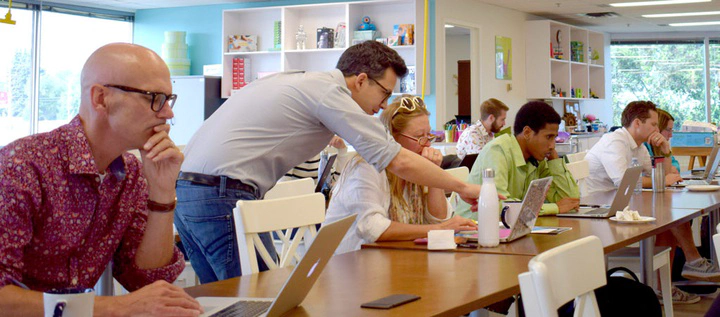Western Canadian teachers trial new technology to build computational thinking

Callysto training workshops empower teachers to lead digital literacy programs in the classroom.
Teachers from across Western Canada are embracing their technological curiosity and learning to navigate a new educational platform that will build the computational skills of their students. Callysto integrates research and analytics capabilities, along with other computing functions such as coding, interactive graphics, multimedia, and digital math functions. The result is a multimodal learning experience for students.
The platform is part of a two-year pilot project by Cybera and the Pacific Institute for Mathematical Sciences (PIMS), who received funding from the federal government’s CanCode program to develop and employ new technologies that promote digital literacy in grades 5-12 classrooms.
Starting in May 2018, the Callysto team has held training workshops with teachers in Western Canada to demonstrate the potential of this free, online, curriculum-based teaching tool. Participants have been provided access to Callysto “notebooks” (think “interactive textbook”) covering an array of subjects ”from math to history” to gain firsthand technical experience of this new tool. They have also been given the confidence to explore and experiment with building their own curriculum-based notebooks.
One of the most recent workshops, held at the University of Alberta in June, included a presentation by David Hay, a grade 6 teacher at Westboro Elementary School in Sherwood Park, who has been using the notebooks in his class since September 2017.
“I think Callysto is a great tool, both for hosting student work, as well as the resources that are being developed by the users,” says Hay. “A number of my students have been inspired to solve problems using Python [a type of code] on their Callysto server, even when it has not been part of an assignment. Some even listed Callysto as one of their top five highlights in their year-end reflection!”
As well as introducing the basics of using the platform, the Callysto training workshops are also helping teachers strengthen their digital literacy and flex their computational thinking muscles.
“I have not played with code since I was in high school, but Callysto is super straightforward,” says Jake Ferbey, an elementary teacher at Nellie Carlson School in Edmonton, who attended the June workshop. “Everything we do is online now. Everything revolves around technology. No matter how much you might want to resist it, it is coming. The more you can keep up with technology, the more capable you will be in accessing whatever comes your way.”
“It is a little overwhelming, because of the number of things that can be done with [Callysto], but I am excited,” says Evan Lock, a junior high science teacher at Esther Starkman School in Edmonton, who also attended the June workshop. “Teachers are preparing the next generation for the realities of the world, and we need to make sure our kids are equipped with the right computing skills. I think getting teachers on-board with some of the best tools available will help students be ready for the future workforce.”
Despite some early apprehension, by the end of the workshop, some of the participants were already talking about using Callysto in their schools in the near future.
“I have a group of children who are very interested in code,” says Ferbey. “They love to code, and [Callysto] could be a way for these kids to work on an extension activity from their Google Docs assignments. It might be a little scary for those who have not seen code before, but if you break it down and make it easy to understand, I think everyone, even those who have never worked with code before, could easily wrap their heads around it.”
“We are happy with the progress of the Callysto project to date,” says Dr. Barb Carra, Chief Operating Officer of Cybera. “The positive feedback we have received from educators tells us there is a definite need and desire to increase digital skills and applications in education. We are progressively training more technology-loving teachers on how to use the Callysto platform, so their classrooms, and our leaders of tomorrow, may also benefit from the innovative teaching and learning tool.”
There is no cost to attend a Callysto training workshop, and teachers’ substitute fees are covered by the project. The next round of workshops will begin the week of August 20 in locations across British Columbia, Alberta and Saskatchewan. To see the list of upcoming workshops, or to schedule a workshop with your school, please visit the Callysto Events page.
ABOUT CYBERA
Cybera is a not-for-profit technology-neutral organization responsible for driving Alberta’s economic growth through the use of digital technology. Its core role is to oversee the development and operations of Alberta’s cyberinfrastructure ”” the advanced system of networks and computers that keeps government, educational institutions, not-for-profits, business incubators and entrepreneurs at the forefront of technological change.
Working with government, education, and private sectors, Cybera is creating a community that champions vital networking and computing services and utilities for everyone, everywhere. We also provide member organizations with unbiased, highly skilled expertise on technology products, processes or services, and access to shared IT tools.
ABOUT PIMS
The Pacific Institute for the Mathematical Sciences (PIMS) is a collaborative network dedicated to the promotion of discovery, understanding and awareness in the mathematical sciences. PIMS brings together leading researchers from major universities across western Canada, as well as the University of Washington, and is also affiliated with CNRS, the French national agency for scientific research, as a Unité Mixte Internationale (International Joint Unit).
PIMS sponsors and organizes educational and community outreach, aboriginal math camps, and summer schools for both teachers and students, as well as initiatives to promote diversity in mathematics, partnerships that bring mathematical research to industry, cutting edge mathematical and scientific research, and events across the PIMS network that promote advancement in computer science, pure and applied mathematics, and statistics.
MEDIA CONTACT
Meagan Hampel
Director of Communications, Cybera
meagan.hampel@cybera.ca | (403) 210-5271